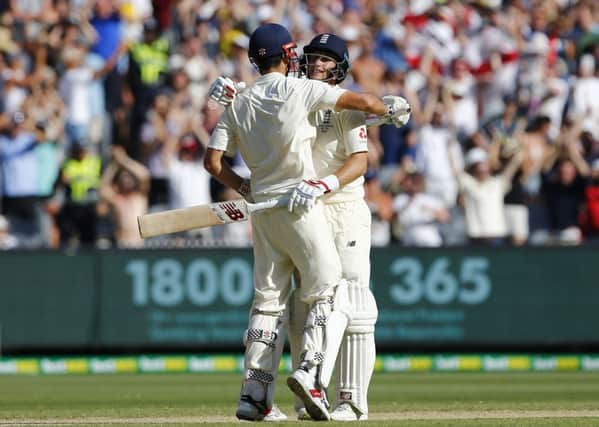Chris Waters '“ The Ashes: England provide glimpse of what should have been


Such was the dilemma caused by England’s performance on day two of the fourth Test in Melbourne.
One was certainly entitled to feel cheesed off, for England’s efforts showed why many people – this writer included – thought that they would make a decent fist of the Ashes.
Advertisement
Hide AdAdvertisement
Hide AdInstead, they are 3-0 down and playing for pride, the horse having bolted so long ago that there is now a multi-storey car park where the stable door used to be.
Better late than never, and after Australia lifted their overnight 244-3 to 260-3, England fought back to dismiss them for 327 before reaching 192-2 at stumps, raising the prospect of a consolation win.
Stuart Broad, written off as a horse ready only for the knacker’s yard, led the charge with 4-51 from 28 overs.
Alastair Cook, written off as a horse who had lost its competitive edge and pined only for the family farm, followed up with an unbeaten 104.
Advertisement
Hide AdAdvertisement
Hide AdAnd so the day ended with the “form is temporary, class is permanent” cliche being wheeled out of cricket’s nursing home, given a quick tour of the garden and then wheeled back inside.
It was then a case of calming tablets all round for English cricket fans, for whom despondency had given way to mild delirium, followed by sweet dreams leavened with a thousand caveats.
Of course, by the time you read these ramblings, presumably at gunpoint, it is hardly inconceivable that the tables will have turned and the normal order of events restored.
As Michael Vaughan put it last night: “England are in a fantastic position and have won day two convincingly… but we can’t get ahead of ourselves with this England side.”
Advertisement
Hide AdAdvertisement
Hide AdTime and again, the English lion has roared before suddenly losing its voice and sloping off back to the zoo, tail between legs.
But whereas England have played well in patches, Australia have played well for long periods, the comfortable victory margins in Brisbane, Adelaide and Perth reflecting that fact.
Above all, the second day of the Melbourne Test was darned frustrating for England and their fans.
It was a day that told a story not only of what might have been but also, if the players are honest with themselves, what should have been. It was a day that revealed that there is still life in England’s old dogs and also that there are weaknesses in an Australian team ranked – lest we forget – fifth in the world.
Advertisement
Hide AdAdvertisement
Hide AdEven accounting for the absence through injury in this match of pace bowler Mitchell Starc, the series’ leading wicket-taker, and the fact that Pat Cummins was struggling with a stomach bug, England had not played to their potential hitherto.
At the same time, the day also highlighted how Starc, Cummins and fellow pace bowler Josh Hazlewood – supported by spinner Nathan Lyon – have been the difference on this tour, with little between the respective batting line-ups.
The Australian pace trio had never previously played together in Tests due to injury and, as if to emphasise its collective fragility, is not playing together now due to Starc’s damaged heel.
But even against Australia’s full-strength side England have competed only for their hard work to unravel with unseemly haste. Few players (certainly not Broad and Cook, for all their mettle at the MCG) could claim to have delivered what their country needed – and, more importantly, when it needed it.
Advertisement
Hide AdAdvertisement
Hide AdThe reality for England is that those players – most definitely Cook, perhaps less so Broad - are, by and large, the best men available.
There is no-one fit and ready to hand who might have been drafted in at Melbourne, unless one took a punt on Mark Wood’s fitness or uncapped leg-spinner Mason Crane, or chose to shake up the batting by drafting in Gary Ballance.
If Crane does not play in the last Test in Sydney, which he surely should unless Moeen Ali suddenly metamorphoses into Jim Laker, one can only wonder what the point was in taking him in the first place.
But the overriding point is that England were not blessed with too many alternatives for the MCG, even if their selection erred on the side of caution, and that Cook and Broad delivered a belated reminder of their time-honoured skills.